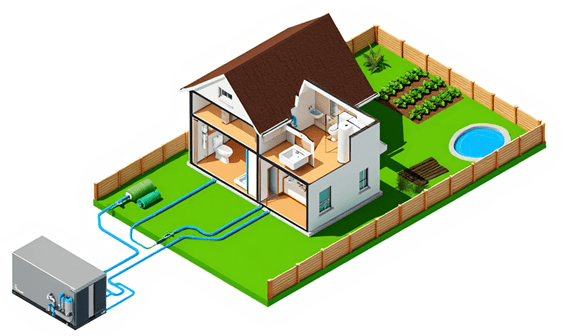Innovation / NGSS Project
Next Generation Sanitation Systems (NGSS) Project
The NGSS Project is an initiative shaping the future of sanitation solutions led by the International Water Association (IWA) and the Gates Foundation (GF) Water, Sanitation, and Hygiene (WSH) programme.
This project seeks to identify technological solutions that may consist of fully integrated systems capable of treating all household wastewater including both blackwater and greywater or sub-systems that contribute to the functionality of such integrated systems especially in low- and middle-income countries (LMICs). These solutions are expected to be cost-competitive, robust, and scalable.
The key objective being to achieve a pathway to cost reduction of these solutions and facilitate compliance with ISO 30500 by the year 2026, a standard widely recognised as a key benchmark for integrated sanitation systems in North America, Europe, and other global regions. While ISO 30500 serves as the principal reference, the project will also take into account alignment with other relevant or more stringent national and international standards.

The Application Process
The three phases of the NGSS Project’s are:
Phase 1 – Global Call for Ideas
An open invitation for applications. Applications were reviewed by a panel of experts based on innovation, feasibility, cost-efficiency, and robustness.
Phase 2 – Refinement Workshop
Selected teams were invited to a collaborative workshop in Bangkok, Thailand, to refine and optimise their technologies for real-world application and testing.
Phase 3 – Funding & Development:
Finalists (selected from among the Phase 2 group) will receive financial support (from a shared pool of up to $3 million USD) and tailored technical guidance to bring their solutions to market readiness by 2026.
Meet the Expert Panel

Sonia Grego
CEO, Coprata

Bill Barber
Technical Director at Cambi

Farhad Kamranvand
Principal Asset Optimisation Consultant, Jacobs

Peng Wang
Director, Institute of Carbon Neutrality and Green Development, Sun Yat Sen University

Ashwin Dhanasekar
Principal – Research & Innovation, Brown & Caldwell
FAQs

Need help?
Contact our NGSS Project Manager
For enquiries about the NGSS Project, please contact Elena Fernandez-Miranda
Subscribe to our newsletters
IWA and sector updates
to your inbox
Follow us